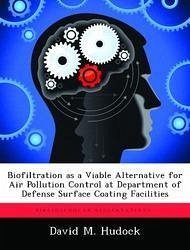Surface coating operations at aircraft depot facilities are common throughout the Department of Defense (DoD). During paint application processes at Navy and Marine Corps Fleet Readiness Centers (FRCs), spray paints emit volatile organic compounds (VOCs) known to have harmful effects on human health and the environment. FRC East at Marine Corps Air Station Cherry Point, does not control the emissions of VOCs from any of its paint booths. The purpose of this research is to determine if FRC East and its surrounding area can benefit both economically and environmentally from a biofiltration system for air pollution control (APC) rather than the current conventional method of dry filtration. Dry filtration reduces only particulate matter in waste air streams and though there was no regulatory requirement to control VOC emissions at FRC East, the possibility exists that such legislation may be enacted in the future, affecting this facility and other similar DoD facilities. Three biofilters were designed for this study. The cost of each was analyzed using a net present value calculation and compared to potential monetary savings amongst the local population should VOC emissions from FRC East be controlled. Results show that FRC East and similar DoD facilities can benefit environmentally and economically from VOC control using biofiltration technologies.
Hinweis: Dieser Artikel kann nur an eine deutsche Lieferadresse ausgeliefert werden.
Hinweis: Dieser Artikel kann nur an eine deutsche Lieferadresse ausgeliefert werden.








